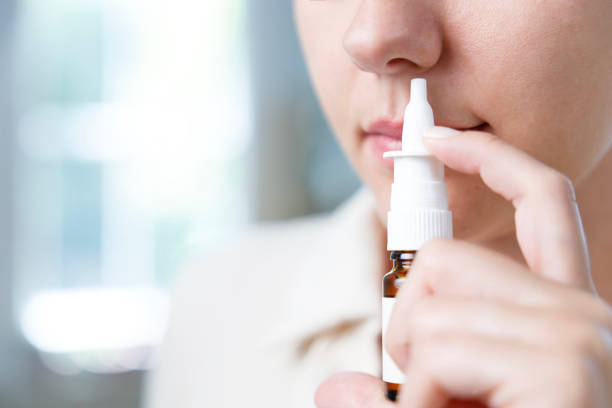USP Fine Particle Dose Determination Testing
The United States Pharmacopeia (USP) fine particle dose determination test is a critical procedure that ensures product quality and safety, particularly for inhalation and nasal products. This test evaluates the distribution of particles within the dosage unit to ensure they fall within acceptable size ranges as specified by USP standards. The primary goal is to guarantee that each dosing event delivers an accurate therapeutic effect without exposing patients to excessive or unnecessary particle exposure.
The USP fine particle dose determination testing process involves several steps, including sample preparation and characterization, instrumental analysis using laser diffraction technology, and statistical evaluation of the data. This method allows for a precise quantification of particles in the size range that is relevant for inhalation therapy or nasal sprays.
The test procedure begins with the dissolution of the dosage unit into an appropriate solvent to form a homogeneous suspension. The suspension is then filtered through a series of sieves to separate the particles according to their aerodynamic diameter, which mimics human respiratory tract behavior during inhalation. This step ensures that only relevant particle sizes are evaluated.
The next stage involves instrumental analysis using dynamic light scattering (DLS) or laser diffraction techniques, depending on the required resolution and range of particle sizes. These methods provide accurate size distribution data over a wide range of particle diameters, typically from 0.1 micrometers to several hundred micrometers.
The collected data is then analyzed statistically to determine whether the particle size distribution meets the USP acceptance criteria for fine particles in inhalation or nasal products. The USP monograph provides specific limits for the percentage of particles within certain size ranges, ensuring that the product delivers consistent dosing and minimizes potential side effects.
Understanding the importance of this test is crucial for quality managers, compliance officers, R&D engineers, and procurement personnel involved in pharmaceutical manufacturing. It ensures that each dosage unit consistently delivers the intended therapeutic effect without exposing patients to excessive fine particles, which could lead to adverse respiratory events or other health issues.
For instance, in the context of nasal sprays, the USP fine particle dose determination test helps ensure that the spray delivers an appropriate amount of medication directly into the nasal cavity. This is particularly important for treatments targeting conditions like allergies or chronic sinusitis, where precise dosing can significantly impact treatment efficacy.
Inhalation products, such as metered-dose inhalers (MDIs), also benefit from this testing. MDIs are designed to deliver aerosolized particles directly into the lungs, and ensuring that these particles fall within the acceptable size range is essential for effective drug delivery and patient safety. The USP fine particle dose determination test helps manufacturers verify that their products meet stringent regulatory requirements.
The significance of this testing extends beyond compliance with regulations; it also supports continuous improvement in product development and manufacturing processes. By regularly monitoring particle distribution, manufacturers can identify potential issues early in the production cycle and make necessary adjustments to maintain consistent product quality.
Why It Matters
The USP fine particle dose determination test is of paramount importance for ensuring patient safety and efficacy in pharmaceutical products, especially those intended for inhalation or nasal use. Particle size directly impacts how effectively a drug can be delivered to the target site, as well as the potential for adverse effects.
For inhalation products, such as asthma inhalers, the particle size must be small enough to reach deep into the lungs but large enough to avoid being inhaled into the alveoli. Excessive fine particles can accumulate in the upper airways, leading to irritation and inflammation. Conversely, particles that are too coarse may not reach the intended lung regions, reducing therapeutic effectiveness.
In nasal products like decongestants or antihistamines, particle size is equally critical. The particles must be small enough to penetrate the nasal mucosa but not so fine as to cause irritation. Ensuring consistent particle distribution helps manufacturers deliver a uniform dose across all units of a product, which is essential for maintaining therapeutic efficacy and patient safety.
The USP fine particle dose determination test provides a quantitative measure of these critical parameters, allowing manufacturers to make data-driven decisions that enhance the quality and safety of their products. Compliance with USP standards not only ensures regulatory approval but also builds consumer trust by demonstrating a commitment to excellence in product development and manufacturing.
Industry Applications
- Inhalation Therapy: Ensuring consistent particle size distribution for metered-dose inhalers (MDIs) and dry powder inhalers (DPIs).
- Nasal Sprays: Verifying that particles deliver the intended dose without causing irritation or excessive exposure.
- Aerosol Generators: Evaluating the particle size of aerosols produced by nebulizers to ensure they meet therapeutic requirements.
Eurolab Advantages
At Eurolab, our expertise in USP fine particle dose determination testing is unparalleled. We offer a comprehensive suite of services tailored to the needs of pharmaceutical manufacturers and researchers:
- Accurate Testing: We use state-of-the-art equipment and methodologies to ensure precise particle size measurements.
- Comprehensive Reporting: Our reports provide detailed insights into particle distribution, helping you make informed decisions about product development and manufacturing processes.
- Expert Consultation: Our team of experienced scientists provides guidance on how to optimize your product design for compliance with USP standards.
- Regulatory Compliance: We ensure that all testing aligns with the latest USP monographs and other relevant regulatory guidelines.





